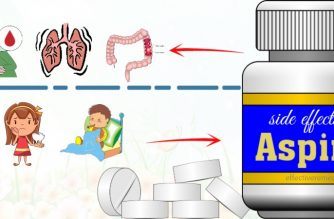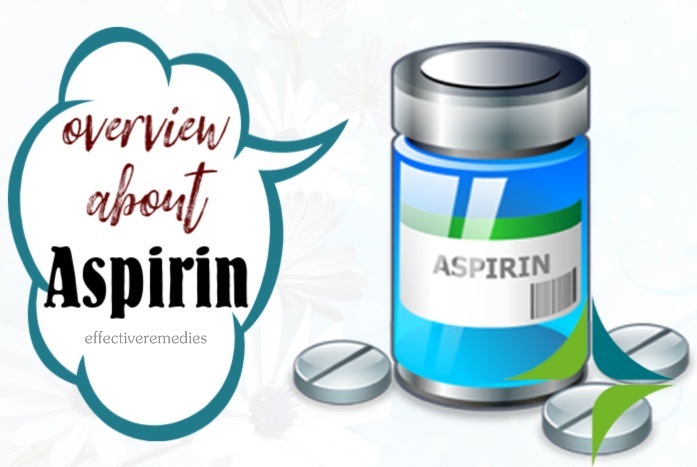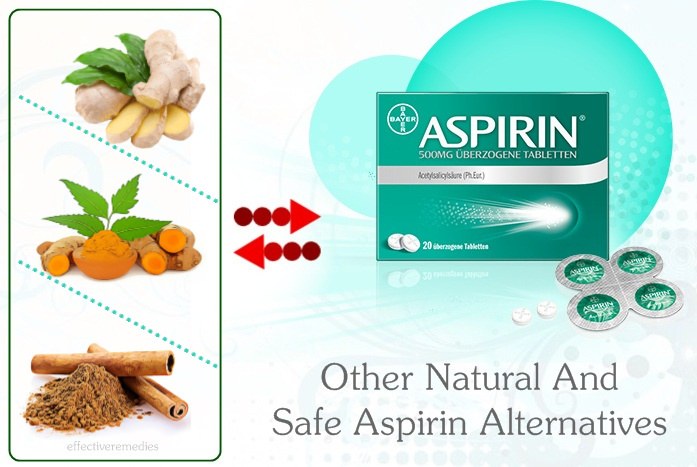Table of contents
Pollution, duty food, bad habits, wrong diet, etc. are the reasons for many diseases in modern life. People have the intention to use aspirin to treat diseases and their symptoms. Taking medicine regularly may help you escape from the pain immediately but it is not the safe treatment. In our article today, we will give you an overview of aspirin, including common side effects of aspirin and natural alternatives that are easy to find and almost safe for your health.
Medically reviewed by Dr. Millie Lytle:
Common Side Effects Of Aspirin You May Not Know And 6 Natural Alternatives You Should Try
I. Overview About Aspirin
1. What Is Aspirin?
Aspirin, called acetylsalicylic acid (ASA) is a painkiller used to relieve inflammation, aches, or pains such as headaches, toothache, cold, fever, flu, etc. Aspirin can treat specific inflammatory conditions such as pericarditis, Kawasaki disease, and rheumatic fever.
You can buy aspirin in pharmacies, shops, and supermarkets. Some aspirin just can be sold when you have a prescription from doctors. For many diseases such as heart attack or high blood level, the doctor may ask you to take aspirin daily.
2. Side Effects Of Aspirin
Aspirin can relieve your pain immediately, so it is certain that aspirin has side effects, which are not good for your health.
EffectiveRemedies Partner Solutions

Ask a Doctor Online and Get Answers in Minutes, Anytime!
Have medical questions? Keep asking questions to a Verified Expert until you get the answer you need.
An upset stomach is a common adverse effect of aspirin. More significant side effects are stomach bleeding, stomach ulcers, and worsening asthma. Consuming too much aspirin can lead to ulcers. A study published in 1994 shows that aspirin may be the reason for higher risks of bleeding duodenal ulcer, bleeding gastric ulcer, and possibly non-ulcer bleeding[1]. Furthermore, according to a study in 2018, using aspirin for a long time may help reduce the risk of colorectal cancer, but increase the risk of gastrointestinal bleeding[2]. Besides, the mixture of acetaminophen and aspirin may cause greater kidney toxicity[3]. The short-term side effect of aspirin may be reducing the hearing[4]. This study indicates that 1.95 grams of aspirin a day make hearing worse. Additionally, using aspirin to treat cardiovascular must be seen carefully to avoid the most serious side effect, which is stroke[5].
II. Other Natural And Safe Aspirin Alternatives
1. Ginger
It is not difficult to find ginger in every kitchen. This simple and small ingredient can become an effective aspirin because of its various benefits on health. According to a study in 2013, thanks to the anti-inflammatory effect, ginger may relieve muscle pain after intense physical activity[6]. This study also shows that ginger may prevent cancer because of the presence of its functional ingredients such as gingerols, shogaol, and paradols[6]. Moreover, a study in 2015 concludes that the existence of antiinflammatory and anti-oxidative properties make ginger become a likely useful treatment of chronic inflammatory diseases[7]. Besides, ginger aids digestive health (indigestion, constipation, and ulcer)[6]. In particular, according to a study in 2015, ginger is beneficial for treating many types of gastrointestinal cancer such as gastric cancer, pancreatic cancer, liver cancer, colorectal cancer, and cholangiocarcinoma[8]. Furthermore, the Food Revolution Network indicates that ginger can help treat heart disease, stroke, and diabetes. Daily consumption of ginger may also help reduce hypertension and coronary heart disease, including the probability of hypertension complications[9]. It may also reduce glucose and lipids in diabetics[10]
2. Cinnamon
Cinnamon is one of the best natural remedies, which provide you with many health benefits. It is used for not only adding flavor in meals but also improving the health. According to a 2003 study published in the American Diabetes Association, taking cinnamon daily will help people with type 2 diabetes, decrease the risk of diabetes, and cardiovascular diseases factors by reducing blood sugar levels and “bad” cholesterol[11]. Moreover, because of its antioxidant and antibacterial properties, cinnamon may reduce lipid peroxidation which causes cancer[12]. For women who have breast cancer, the mixture of cinnamon and honey is the way to improve the quality of their health[13]. Moreover, according to Dr. Lipi Roy, an internal medicine physician at Harvard-affiliated Massachusetts General Hospital, cinnamon may lower the viral load and the rate of progression of Alzheimer's disease[14]. Cinnamaldehyde in cinnamon has many benefits on health, such as lowering blood sugar and cholesterol, and preventing neurodegenerative diseases[14]. The article of The University of Maryland, Baltimore, points out that having cinnamon tea after dinner helps us reduce blood sugar levels at night, prevent metabolic disease, and stimulate weight loss[15]
3. Fruits And Vegetables
A simple way to protect yourself from diseases is adding fruits and vegetables to your daily meals. Nowadays, more and more people tend to consume a large number of fruits and vegetables because of their antioxidants which bring multiple benefits to health related to prevention and reduction of the risk of cancer, diabetes, neurodegenerative diseases, and heart and brain vascular diseases[16]. To support this argument, the Havard T.H. Chan’s School of Public Health shows the benefits of fruits and vegetables on reducing blood pressure, risk of heart disease and stroke, and preventing some types of cancer[17]. For example, people who take averaged 8 or more servings of fruits and vegetables a day will have a lower risk of heart attack or stroke by 30%, in comparison with people who eat less than 1.5 servings a day[17]. Moreover, as we know, fruits and vegetables contain little calories and fat. They have a large amount of fiber and vitamins such as vitamin A and C, which are necessary for health. A study in 2012 finds out that bioactive in fruits and vegetables may prevent some diseases such as hypertension, coronary heart diseases, and cancers[18]. Therefore, do not forget to consume fruits and vegetables regularly to get their benefits.
4. Turmeric
Turmeric has curcumin, which brings many benefits to health. According to a study conducted in 2017, curcumin has antioxidant and anti-inflammatory effects so that it can prevent various diseases such as Alzheimer’s disease (AD), Parkinson’s disease, cardiovascular disease, cancer, arthritis, psoriasis, diabetes, obesity[19]. A 2016 study showed the efficacy of using turmeric extract (about 1000 mg/day of curcumin) in treating arthritis[20]. About the benefits of heart health, a study in 2009 points out the effects of antioxidant of curcumin on reducing the adriamycin-induced cardiotoxicity and preventing diabetic cardiovascular complications[21]. This study also states the relationship between curcumin and reduction of serum cholesterol level. Along with that, according to a study in 2018, curcumin suppresses the initiation, progression, and metastasis of a variety of cancers[22]. Moreover, because curcumin can kill tumor cell types through different mechanisms, it may be used for drug development[23].
5. Magnesium
Your body needs magnesium to do more than 300 chemical reactions in the body. Magnesium helps maintain your heart beating and make the muscles stronger[24]. The sources of magnesium are fish, nuts, green leafy vegetables, beans, etc. A review in 2013 concludes that magnesium has positive effects on symptoms of migraine headaches, Alzheimer’s disease, cerebrovascular accident (stroke), hypertension, cardiovascular disease, and type 2 diabetes mellitus[25]. Therefore, magnesium is commonly used to manage these diseases. Also, along with supporting that magnesium is good for physical health, a study in 2017 provides the evidence of benefits of magnesium on mental health because supplying magnesium is the way to reduce depression, attention deficit disorder, and promote smoking cessation[26]. The National Institutes of Health shows many studies which prove the improvement of the health of patients when they take enough magnesium[27].
6. Omega-3 Fatty Acids
According to Washington State Department of Health, the omega 3 fatty acids are beneficial for helping us have good health because it lowers blood pressure and reduces the heart problems such as heart attacks, abnormal heart rhythms, and strokes[28]. Moreover, the omega 3 fatty acids have effects on preventing depression, Alzheimer’s disease, dementia, diabetes, and arthritis. The Gruppo Italiano per lo Studio della Sopravvivenza nell’Infarto Miocardio (known as the GISSI Prevention Trial) proves that people who survive after a heart attack are told to take a 1-gram capsule of omega-3 fats daily for three years will have a lower risk of sudden cardiac death by about 50 percent[29]. The popular sources of the omega 3 fatty acids are fish (especially salmon, anchovies, herring, mackerel, tuna, and sardines), chia seeds, walnuts, olive oil, etc.
To conclude, aspirin can help you relieve the pain, but it also has side effects on health. Therefore, you should ask the doctor about the type of aspirin you have to take and the amount of aspirin you can consume. Besides, you can use other natural ones as mentioned above to improve your health.
We hope that the information in this article is interesting and useful for you. All content provided is for informational & educational purposes. We recommend you consult a healthcare professional to know you are allergic to some ingredients or not and to determine your health condition, especially for children and women in pregnancy. The doctor can give you a suitable diet and advice for your diseases if you have.
Please share with us if you know the other side effects of aspirin on health. Also, if you want to read more such articles, you can visit the News & Facts page.










